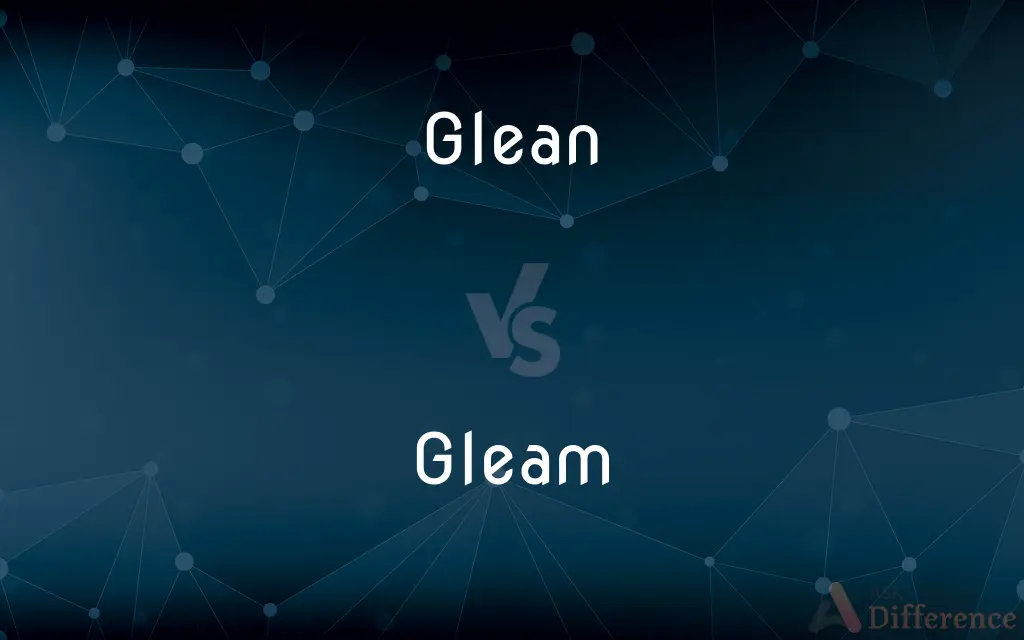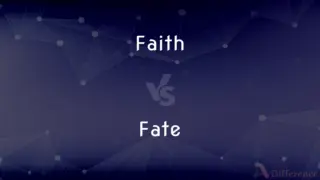Glean vs. Gleam — What's the Difference?
By Maham Liaqat & Urooj Arif — Updated on March 14, 2024
Glean involves gathering information bit by bit, while gleam refers to a brief or faint light.

Difference Between Glean and Gleam
Table of Contents
ADVERTISEMENT
Key Differences
Glean typically refers to the act of collecting information or material slowly and carefully, piecemeal. It is often used in contexts where the process is metaphorically likened to gathering leftover grains after a harvest. On the other hand, gleam usually denotes a flash or beam of light, often one that is not particularly bright but is noticeable due to its shine or reflection. This can refer to the way light might catch on a surface or the way someone's eyes might light up briefly.
While glean is primarily associated with acquiring knowledge or information in a gradual, often laborious manner, gleam is more about the physical appearance of light or brightness. The former is an action often requiring patience and attentiveness, whereas the latter is a quality or characteristic that can be observed passively.
In a figurative sense, to glean can also mean to understand or deduce something indirectly or from scattered pieces of information. Gleam, in contrast, might be used metaphorically to describe a fleeting glimpse of something, such as hope or understanding, often providing just enough insight to be noticeable.
Glean's usage is commonly found in contexts involving research, study, or any scenario where information is fragmented or not readily available. Gleam, conversely, is often used to describe visual phenomena, adding a poetic or vivid quality to descriptions of objects, people, or scenes that catch light in a particular way.
Comparison Chart
Primary Meaning
To collect gradually and bit by bit
To emit a soft, subdued light
ADVERTISEMENT
Context of Use
Information gathering, research
Describing light or shine
Metaphorical Use
Understanding something indirectly
A brief or faint indication
Associated Actions
Researching, studying, observing
Reflecting, shining, glimmering
Figurative Implications
Patience, diligence
Fleetingness, subtlety
Compare with Definitions
Glean
To learn, discover, or find out, usually little by little or slowly.
He gleaned his facts from various books.
Gleam
A brief or faint appearance.
A gleam of hope flashed across her face as she heard the news.
Glean
To gather (grain or the like) after the reapers or regular gatherers.
After the harvest, the villagers would glean the fields for leftover grains.
Gleam
A shimmering or reflective quality.
The polished marble floors had an elegant gleam.
Glean
To gather what is left by reapers.
The ancient practice of gleaning allowed the poor to collect leftover crops from farmers' fields.
Gleam
To shine softly and with a subdued light.
The moon gleamed softly through the clouds.
Glean
To gather slowly and laboriously, bit by bit.
She gleaned the necessary data for her thesis from numerous sources.
Gleam
A flash or beam of light.
The gleam of the lighthouse warned ships away from the shore.
Glean
To collect or gather anything little by little or slowly.
She gleaned a small collection of antique coins from estate sales.
Gleam
To emit a weak or reflected light.
The fireflies gleamed in the dark summer night.
Glean
To gather grain or other produce left behind in a field after harvest.
Gleam
A brief beam or flash of light
Saw gleams of daylight through the cracks.
Glean
To gather (grain or other produce) left behind after harvest.
Gleam
A steady but subdued shining; a glow
The gleam of burnished gold.
Glean
To gather grain or other produce left behind in (a field).
Gleam
A brief or dim indication; a trace
A gleam of intelligence.
Glean
To collect bit by bit
"records from which historians glean their knowledge" (Kemp Malone).
Gleam
To emit a gleam; flash or glow
"Their tile roofs gleamed in the moon's pallid radiance" (Laura Joh Rowland).
Glean
To collect what is left behind (grain, grapes, etc.) after the main harvest or gathering.
Gleam
To be reflected as a gleam
The sun gleamed on the water.
Glean
To gather what is left in (a field or vineyard).
To glean a field
Gleam
To be manifested or indicated briefly or faintly.
Glean
(figurative) To gather information in small amounts, with implied difficulty, bit by bit.
Gleam
(countable) An appearance of light, especially one which is indistinct or small, or short-lived.
Glean
To frugally accumulate resources from low-yield contexts.
Gleam
An indistinct sign of something; a glimpse or hint.
The rescue workers preserved a gleam of optimism that the trapped miners might still survive.
Glean
A collection made by gleaning.
Gleam
A bright, but intermittent or short-lived, appearance of something.
Glean
To gather after a reaper; to collect in scattered or fragmentary parcels, as the grain left by a reaper, or grapes left after the gathering.
To glean the broken ears after the manThat the main harvest reaps.
Gleam
A look of joy or liveliness on one's face.
Glean
To gather from (a field or vineyard) what is left.
Gleam
(obsolete)
Glean
To collect with patient and minute labor; to pick out; to obtain.
Content to glean what we can from . . . experiments.
Gleam
(countable) Sometimes as hot gleam: a warm ray of sunlight; also, a period of warm weather, for instance, between showers of rain.
Glean
To gather stalks or ears of grain left by reapers.
And she went, and came, and gleaned in the field after the reapers.
Gleam
(uncountable) Brightness or shininess; radiance, splendour.
Glean
To pick up or gather anything by degrees.
Piecemeal they this acre first, then that;Glean on, and gather up the whole estate.
Gleam
(transitive) Chiefly in conjunction with an adverb: to cause (light) to shine.
Glean
A collection made by gleaning.
The gleans of yellow thyme distend his thighs.
Gleam
(intransitive)
Glean
Cleaning; afterbirth.
Gleam
To shine, especially in an indistinct or intermittent manner; to glisten, to glitter.
Glean
Gather, as of natural products;
Harvest the grapes
Gleam
(figuratively) To be strongly but briefly apparent.
Gleam
Of a hawk or other bird of prey: to disgorge filth from its crop or gorge.
Gleam
To disgorge filth, as a hawk.
Gleam
To shoot, or dart, as rays of light; as, at the dawn, light gleams in the east.
Gleam
To shine; to cast light; to glitter.
Gleam
To shoot out (flashes of light, etc.).
Dying eyes gleamed forth their ashy lights.
Gleam
A shoot of light; a small stream of light; a beam; a ray; a glimpse.
Transient unexpected gleams of joi.
At last a gleamOf dawning light turned thitherward in hasteHis [Satan's] traveled steps.
A glimmer, and then a gleam of light.
Gleam
Brightness; splendor.
In the clear azure gleam the flocks are seen.
Gleam
An appearance of reflected light
Gleam
A flash of light (especially reflected light)
Gleam
Be shiny, as if wet;
His eyes were glistening
Gleam
Shine brightly, like a star or a light
Gleam
Appear briefly;
A terrible thought gleamed in her mind
Common Curiosities
Does "gleam" refer to a strong light?
Gleam usually refers to a soft, subtle light rather than a strong, blinding one.
Can "glean" only be used in agricultural contexts?
No, "glean" is often used metaphorically to refer to collecting information slowly and carefully, not just agricultural gleaning.
Can "glean" be used in a positive context?
Yes, gleaning information can be positive, especially when it leads to valuable insights or knowledge.
Is "gleaning" an active or passive process?
Gleaning is an active process that involves effort and attention to detail.
Are there modern applications of "glean"?
Absolutely, "glean" is commonly used in research, data analysis, and information gathering contexts.
Can "gleam" describe sound?
Not typically. "Gleam" is primarily used to describe visual phenomena related to light.
Do "glean" and "gleam" have any commonality?
Both can imply subtlety and a careful observation or perception, but in different contexts (information vs. light).
Does "gleam" imply permanence?
No, a gleam is often fleeting or transient, like a brief flash of light.
Can "gleam" be used metaphorically?
Yes, "gleam" can be used metaphorically to describe anything that resembles a brief or subtle flash of light, such as hope or understanding.
Is "gleam" always visual?
Primarily, yes. "Gleam" pertains to the visual perception of light or brightness.
Can "gleam" refer to emotions?
Indirectly, yes. A person's eyes might "gleam" with joy, anger, or another emotion, indicating a subtle expression of their feelings.
Can "gleam" be used in a negative context?
It can, especially if the gleam is associated with something ominous or deceptive, like the gleam of a predator's eyes.
Can you "glean" something quickly?
Typically, gleaning is a slow process, emphasizing careful gathering of information or materials.
Is "gleaning" considered a positive skill?
Yes, being able to glean information effectively is often seen as a valuable skill, especially in research and analysis.
Share Your Discovery

Previous Comparison
Cornbread vs. Cornpone
Next Comparison
Faith vs. FateAuthor Spotlight
Written by
Maham LiaqatCo-written by
Urooj ArifUrooj is a skilled content writer at Ask Difference, known for her exceptional ability to simplify complex topics into engaging and informative content. With a passion for research and a flair for clear, concise writing, she consistently delivers articles that resonate with our diverse audience.
















































